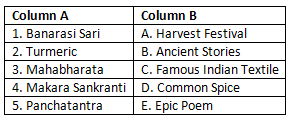Worksheet: Unity in Diversity or 'Many in the One' | Worksheets with Solutions for Class 6 PDF Download
| Table of contents |

|
| Multiple Choice Questions |

|
| Fill in the Blanks |

|
| True or False |

|
| Match the Following |

|
Multiple Choice Questions
Q1: Which of the following is a common staple grain in India?
(a) Corn
(b) Wheat
(c) Cotton
(d) Oats
Q2: What is the primary material used to make traditional saris?
(a) Wool
(b) Silk
(c) Cotton
(d) Jute
Q3: Which festival marks the beginning of the harvest season in India?
(a) Diwali
(b) Makara Sankranti
(c) Holi
(d) Eid
Q4: The Panchatantra is originally written in which language?
(a) Hindi
(b) Bengali
(c) Sanskrit
(d) Tamil
Q5: Which of these is NOT a type of silk sari?
(a) Banarasi
(b) Kanjivaram
(c) Chintz
(d) Mysore
Fill in the Blanks
Q1: The ________ is a long piece of cloth traditionally worn by women in India.
Q2: Common spices used in Indian cooking include ________, cumin, and ginger.
Q3: The two great Indian epics are the ________ and the Mahabharata.
Q4: Indian textiles were historically famous for producing ________ cotton.
Q5: The ________ project surveyed 4,635 communities across India.
True or False
Q1: The sari is an unstitched garment.
Q2: All Indian languages use the same script.
Q3: The Panchatantra has been adapted into many languages.
Q4: Chintz was popular in 17th-century Europe.
Q5: The Mahabharata is a short story.
Match the Following

You can access the solutions to this worksheet here.
FAQs on Worksheet: Unity in Diversity or 'Many in the One' - Worksheets with Solutions for Class 6
| 1. What is the concept of 'Unity in Diversity'? |  |
| 2. How can 'Unity in Diversity' be achieved in a society? |  |
| 3. Why is 'Unity in Diversity' important in today's world? |  |
| 4. What are some examples of 'Unity in Diversity' in different countries? |  |
| 5. How can individuals contribute to promoting 'Unity in Diversity' in their communities? |  |





















